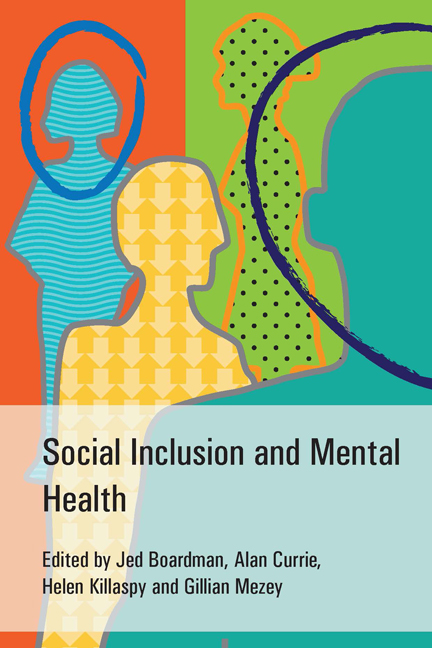Book contents
- Frontmatter
- Contents
- List of contributors
- List of tables
- Foreword
- Preface
- Acknowledgements
- Scoping Group on Social Inclusion, Royal College of Psychiatrists
- Part 1 What is social exclusion?
- 1 Introduction
- 2 Concepts of social exclusion
- 3 Social exclusion of people with mental health problems and learning disabilities: key aspects
- 4 Policy and social exclusion
- 5 How is social exclusion relevant to psychiatry?
- 6 Socially inclusive working across the psychiatric subspecialties
- Part 2 Social exclusion: the scope of the problem
- Part 3 Working towards inclusive psychiatry
- Index
5 - How is social exclusion relevant to psychiatry?
from Part 1 - What is social exclusion?
- Frontmatter
- Contents
- List of contributors
- List of tables
- Foreword
- Preface
- Acknowledgements
- Scoping Group on Social Inclusion, Royal College of Psychiatrists
- Part 1 What is social exclusion?
- 1 Introduction
- 2 Concepts of social exclusion
- 3 Social exclusion of people with mental health problems and learning disabilities: key aspects
- 4 Policy and social exclusion
- 5 How is social exclusion relevant to psychiatry?
- 6 Socially inclusive working across the psychiatric subspecialties
- Part 2 Social exclusion: the scope of the problem
- Part 3 Working towards inclusive psychiatry
- Index
Summary
In previous chapters we have outlined the concepts of inclusion and the components of exclusion that are relevant to people with mental health problems and learning disability. It is clear that exclusion refers to the position of these groups in relation to society and their status as citizens with access to the same rights and freedoms as others. It is also clear that many of these components of exclusion have been part of social and mental health policy over the past 10 years or more.
In Part 2 of this book we will turn to examine the scope of the problems: the extent of disadvantage, poverty and exclusion in the population of the UK, of people with mental health problems and with learning disability, and in specific social identity groups with mental health problems. To some degree this chapter anticipates Part 2, by setting out the arguments as to why psychiatry should be concerned with social exclusion. However, it is possible to answer this question simply and directly – it is because people with mental health problems (especially those with severe problems) and with learning disability are among the most socially excluded and stigmatised groups in our society. Social exclusion is not only a result of having mental health problems or learning disability, but it is also a cause of mental and physical ill health. It may be worth reflecting at this stage that the key features of the complex multidimensional problems of poverty and social exclusion listed in Box 4.2 (p. 51) all apply to people with mental health problems or learning disability.
For the purposes of this chapter the term psychiatry refers to the individual practice of psychiatrists and to the collective body of psychiatrists as, for example, represented by professional bodies such as the Royal College of Psychiatrists. It encompasses the range of specialties of psychiatric practice including adult, child and adolescent and old age psychiatry, rehabilitation, forensic, addictions and liaison psychiatry, psychotherapy and the psychiatry of learning disability. We outline the general reasons why psychiatry should be concerned with social exclusion. Central to this is what are increasingly being referred to as the recovery-oriented approach and/or socially inclusive practice, and the benefits of these approaches to clinicians, service users and the wider collective.
- Type
- Chapter
- Information
- Social Inclusion and Mental Health , pp. 71 - 85Publisher: Royal College of PsychiatristsFirst published in: 2017



